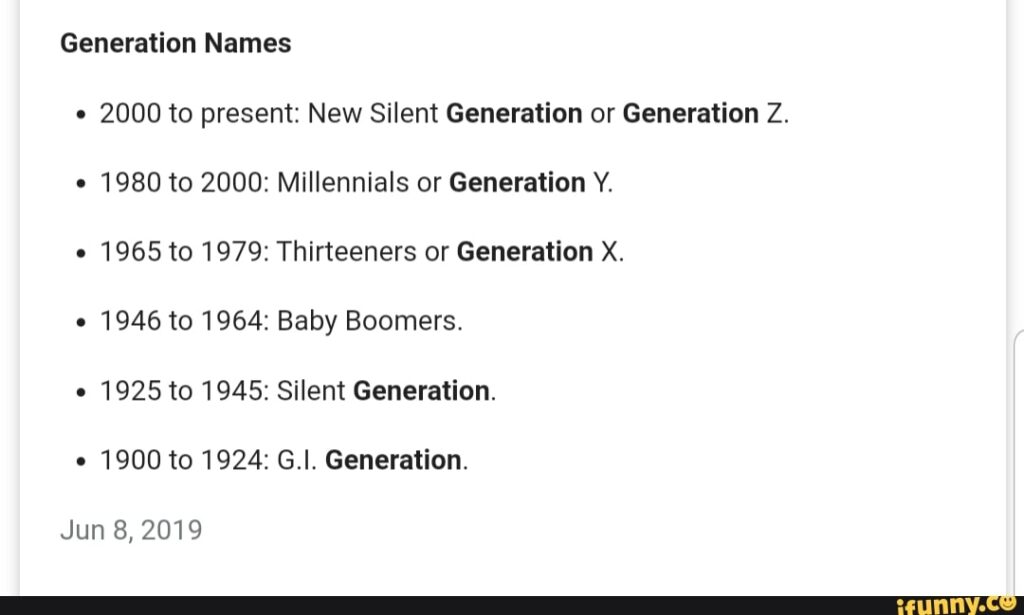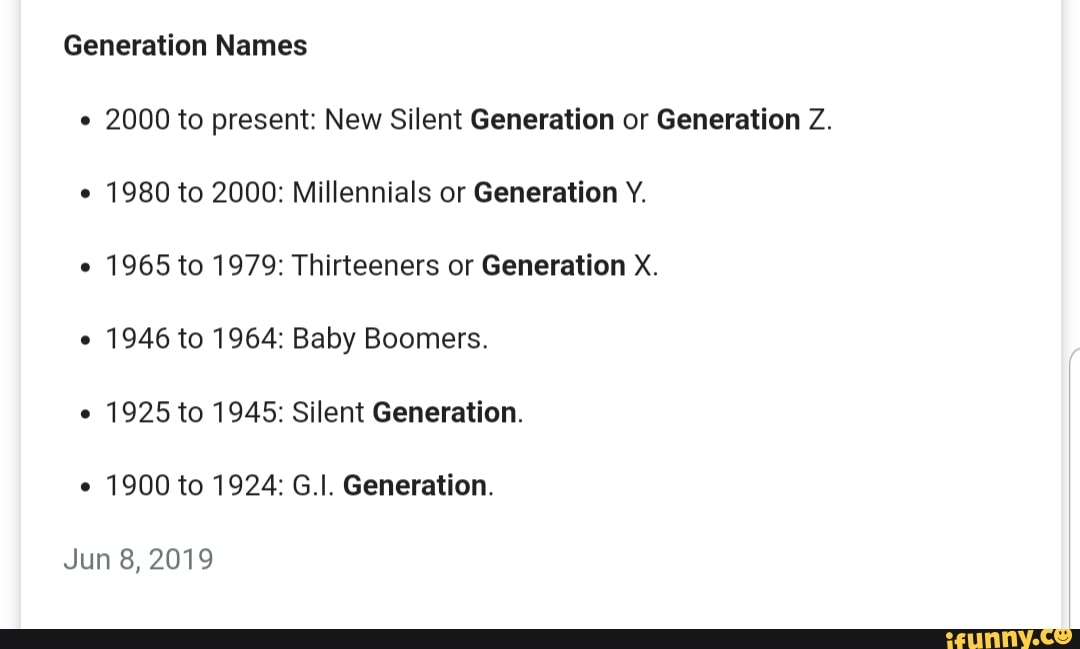
Decoding the Generations: A Guide to Generation Names and Their Defining Traits
Understanding the different generations that make up society is crucial for effective communication, marketing, and even workplace dynamics. Each generation, often identified by specific generation names, is shaped by the historical events, technological advancements, and cultural trends that occurred during their formative years. This article will delve into the various generation names, exploring their defining characteristics, values, and impact on the world. From the Silent Generation to Generation Alpha, we’ll unravel the nuances of each group, providing a comprehensive guide to understanding the generation names that shape our world.
The Silent Generation (Born 1928-1945)
Also known as the Traditionalists, the Silent Generation lived through the Great Depression and World War II. These formative experiences instilled a strong sense of duty, discipline, and respect for authority. They are known for their hard work ethic, frugality, and loyalty. Many members of this generation held long-term jobs and valued stability. Their silence often stemmed from a cultural expectation to be seen and not heard, particularly during their childhood.
- Key Traits: Disciplined, hardworking, loyal, respectful, frugal
- Defining Events: The Great Depression, World War II
- Values: Duty, responsibility, stability
The Baby Boomers (Born 1946-1964)
The Baby Boomers, a demographic cohort significantly larger than previous generations, were born in the post-World War II baby boom. This generation experienced significant social and political change, including the Civil Rights Movement, the Vietnam War, and the rise of feminism. They are often characterized by their optimism, competitive spirit, and focus on career success. They challenged traditional norms and values, contributing to significant cultural shifts.
- Key Traits: Optimistic, competitive, driven, individualistic
- Defining Events: Civil Rights Movement, Vietnam War, the rise of feminism
- Values: Career success, personal growth, social change
Generation X (Born 1965-1980)
Sandwiched between the large Baby Boomer generation and the subsequent Millennials, Generation X is often described as independent, resourceful, and skeptical. They grew up during a time of economic uncertainty, rising divorce rates, and the AIDS epidemic. This generation is known for its adaptability, entrepreneurial spirit, and work-life balance focus. They were among the first to embrace personal computers and the early internet.
- Key Traits: Independent, resourceful, skeptical, adaptable
- Defining Events: Economic recession, rising divorce rates, AIDS epidemic, the rise of personal computers
- Values: Independence, work-life balance, adaptability
Millennials (Born 1981-1996)
Also known as Generation Y, Millennials came of age during the dot-com boom and the September 11th attacks. They are often characterized as tech-savvy, ambitious, and socially conscious. They embrace diversity and are comfortable with technology. Millennials are also known for their desire for meaningful work and a strong sense of purpose. The rise of social media has significantly impacted this generation.
- Key Traits: Tech-savvy, ambitious, socially conscious, collaborative
- Defining Events: Dot-com boom, September 11th attacks, the rise of social media
- Values: Meaningful work, social impact, diversity
Generation Z (Born 1997-2012)
Generation Z, also known as Zoomers, has grown up in a fully digital world. They are highly connected, entrepreneurial, and pragmatic. This generation has witnessed economic instability, social unrest, and the rise of climate change awareness. They are known for their digital fluency, entrepreneurial spirit, and focus on social justice. They are often described as more realistic and less optimistic than Millennials. Understanding generation names helps to understand their different perspectives.
- Key Traits: Digital natives, entrepreneurial, pragmatic, socially conscious
- Defining Events: Economic recession, social unrest, climate change awareness, the rise of social media and influencers
- Values: Social justice, financial security, authenticity
Generation Alpha (Born 2013-2025)
The youngest generation, Generation Alpha, is still being shaped by the world around them. They are the children of Millennials and are growing up in a world dominated by technology, social media, and personalized experiences. It is predicted that they will be the most educated, technologically advanced, and globally connected generation in history. The impact of artificial intelligence and virtual reality will likely be significant on this generation. The study of generation names is crucial to anticipate future trends.
- Key Traits: Digital natives, globally connected, technologically advanced
- Defining Events: The rise of artificial intelligence, virtual reality, and personalized experiences
- Values: Still evolving, but likely to prioritize technology, personalization, and global citizenship
The Importance of Understanding Generation Names
Understanding generation names and their associated characteristics is crucial for various reasons. In the workplace, it can improve communication and collaboration between different age groups. In marketing, it allows for more targeted and effective campaigns. In education, it helps educators tailor their teaching methods to the needs of different learners. By recognizing the unique experiences and perspectives of each generation, we can foster greater understanding and empathy across society.
Furthermore, studying generation names helps us to anticipate future trends and challenges. By understanding the values and priorities of younger generations, we can better prepare for the future workforce, consumer market, and social landscape. For example, Generation Z’s focus on social justice and sustainability is already influencing business practices and political agendas. Similarly, Generation Alpha’s digital fluency will likely drive innovation in technology and education. Understanding generation names is understanding the future.
Criticisms and Limitations of Generational Labels
While generation names provide a useful framework for understanding societal trends, it’s important to acknowledge their limitations. Generational labels are generalizations and do not apply to every individual within a particular generation. There is significant diversity within each generation, and individual experiences can vary widely based on factors such as socioeconomic status, race, ethnicity, and geographic location. Over-reliance on generational stereotypes can lead to inaccurate assumptions and unfair judgments.
Another criticism is that the boundaries between generations are often arbitrary and can vary depending on the source. There is no universally agreed-upon definition of when one generation ends and another begins. Furthermore, the defining events that shape each generation can have different impacts on individuals depending on their age and personal circumstances. Therefore, it’s crucial to use generation names as a starting point for understanding, rather than as a definitive label.
Conclusion
Understanding the different generation names and their defining traits is essential for navigating the complexities of modern society. Each generation has been shaped by unique historical events, technological advancements, and cultural trends, resulting in distinct values, perspectives, and behaviors. While generational labels are generalizations and should be used with caution, they provide a valuable framework for understanding societal trends and fostering greater empathy across different age groups. By recognizing the contributions and challenges of each generation, we can build a more inclusive and collaborative future. The study of generation names allows us to better understand not only the past, but also the future. [See also: Generational Differences in the Workplace] [See also: The Impact of Technology on Generation Z]

